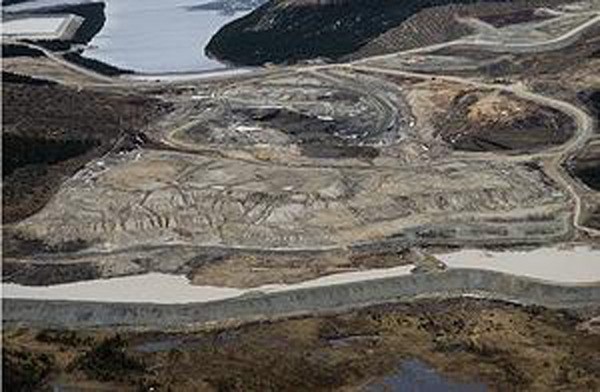Mediated contract talks between Vale and United Steelworkers Local 9508, representing 130 mine and mill workers at Voisey's Bay fly-in nickel mine in northern Labrador, have again broken off after two days of meetings with no deal. The strike, now longer than 14 months, began Aug. 1, 2009.
Last month, Susan Sullivan, Newfoundland and Labrador's minister of human resources, labour and employment and minister responsible for the labour relations agency, appointed independent outside mediator Bill Wells to try and "facilitate an end to the Voisey's Bay strike," she said.
Under the Newfoundland and Labrador Labour Relations Act, the minister has authority to appoint a mediator where the minister is of the opinion that the appointment is "likely to contribute to more harmonious industrial relationships between the parties."
"With the help of Mr. Wells, I urge the parties to negotiate a collective agreement during this round of bargaining and make a determined and honest effort to bring an end to this strike," Sullivan said Sept. 16. "Our government is committed to providing whatever assistance is necessary to the parties to enable them to successfully negotiate a collective agreement."
The striking mine and mill employees are represented by United Steelworkers Local 9508 at Voisey's Bay.
Wells had an extensive career in labour law during the 1970s. He was president of the Fisheries Association of Newfoundland and Labrador during the early 1980s and he was also president of the Canadian Saltfish Corporation. He served as executive vice-president of Fishery Products International from 1985 to 1995.
Wells was appointed as president and chief executive officer of Newfoundland and Labrador Hydro from 1996, until his retirement in 2004, and has been vice-chair of the Standing Fish Price-Setting Panel since its inception in 2006.
Vale expressed disappointment Oct. 3 that contract talks broke off again Sunday night.
"Once again we have come away from our negotiations with USW without any forward progress being made towards concluding a collective agreement," said Tom Paddon, general manager of Vale's operations in Newfoundland and Labrador. "It is clear that the USW's bargaining committee is unwilling or unable to commit to meaningful negotiations. The Union has shown no desire to address the outstanding issues in a constructive manner. In fact, USW's bargaining committee keeps changing its mind on the outstanding issues - their list of issues changes every time we meet."
Talks aimed at finding a settlement had resumed Saturday. Vale said it tabled its fifth settlement proposal on Sunday, which contained a monetary offer that "exceeds settlements in our industry, in this province and in our company." The USW rejected the proposal and responded with new demands, Paddon said.
"We have been fully prepared to engage in collective bargaining from the outset," said Paddon, "however, it takes the commitment and willingness of both parties to discuss all issues and work towards finding common ground. We entered this round of talks with the objective of reaching a deal that meets the needs of our employees and our operations in Labrador. Unfortunately, the absence of any real progress being made at the negotiating table does not bode well for a settlement being reached in the near future."
United Steelworkers Local 9508 President Darren Cove told The Telegram in St. John's the union did not make new demands during contract talks that broke off with Vale Sunday night.
"Absolutely not," Cove said. "The demands that were tabled were tabled back in July.
"Our demands should come as no surprise to the company."
Cove said the union offered to accept the same contract language agreed to by Vale workers in Ontario in July.
He called that "a huge concession - one that we were not sure that the membership would accept."
More than 3,000 workers in Sudbury and Port Colbourne reached a deal with Vale almost a year after they went on strike.
Among the key strike issues were proposals to reduce a bonus tied to the price of nickel, job transfers, contracting out and pensions.
In July, after almost a year on the picket line, striking Steelworkers at Local 6500 in Sudbury and Local 6200 in Port Colborne voted about 75 per cent July 9 to ratify a five-year deal with Brazilian mining giant Vale.
It was the longest strike in Sudbury's history and the longest strike in Vale's 68-year-history. There have been nine strikes at the former Inco operations in Sudbury since 1958, including an 8 -month one from Sept. 15, 1978 until June 7, 1979. It remains the biggest strike in Canadian history in terms of lost workdays.
In July, Paddon said, "the current USW economic demands would increase labour costs at Vale's operations in Labrador by about 45 per cent over the previous collective agreement."
Paddon went onto say at the time, "Since operations began at Voisey's Bay in 2005, the financial arrangements with employees in Labrador have been fundamentally different from those elsewhere in Canada. There are different job classifications and different pension and benefits plans. To suggest that financial arrangements in Labrador should be a photocopy of agreements with USW in Ontario ignores the fact that this has never been the case since operations began. Vale's settlement proposals to date have reflected the unique business needs of Labrador."
No further talks are scheduled.




